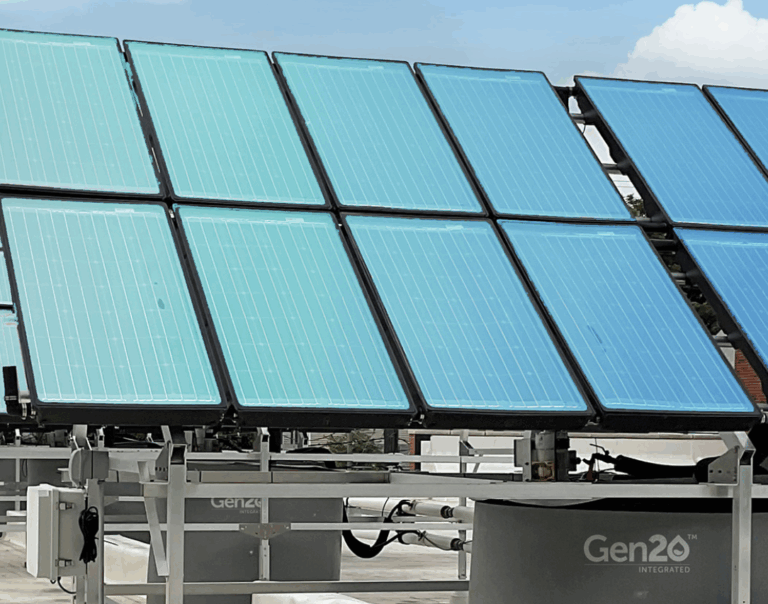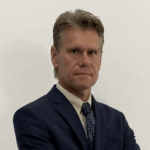
- Kim Kisner
- Business
- 06/24/2025
Decarbonization and Energy Savings Are the Goals

PowerPanel, headquartered in Oxford, focuses on sustainable energy technology with a particular emphasis on hot water systems and thermal energy capture. The company designs and manufactures modular solar hybrid systems that integrate both photovoltaic and thermal components into a single unit. Its goal is to offer energy solutions that are more efficient, durable, and economically viable for a range of commercial and industrial applications.
SBN Detroit interviewed Garth Schultz, founder and president, and Oliver Buechse, who leads strategy and organizational development, about energy planning, misconceptions around renewables, and how Michigan’s engineering legacy could help shape the future of sustainability.

Q: What is the impetus behind PowerPanel—what are you looking to achieve?
Garth Schultz: Our work is driven by two goals – decarbonization and energy savings. We’ve developed a photovoltaic-thermal (PVT) module that combines solar electric and thermal capture in a single footprint. That means you can generate electricity while also capturing heat for domestic hot water or space heating, achieving a form of double decarbonization.
We’ve paired that with a flexible hot water storage system. Water can store energy for long periods – up to 55 hours in some cases – so we’re using it as a thermal battery. The system allows for energy recovery from rooftop solar units or HVAC waste heat and redistributes it through a pump for heating needs. The components are designed for easy installation, using engineered foam and PVC linings.
Oliver Buechse: By reimagining the infrastructure, we’ve been able to introduce solutions that are cost-effective, recyclable, and have longer life cycles. We’re focused on creating practical, adaptable tools for commercial facilities.

Q: What are some of the most common misconceptions businesses have about adopting renewable energy, and how do these misunderstandings slow progress?
Schultz: One major misconception is that renewable energy is always more expensive or only viable with significant incentives. In reality, for domestic hot water systems – especially in commercial settings – the return on investment can be very favorable. The payback period is often short, particularly when combined with existing energy efficiency measures.
There’s also the belief that traditional systems are “good enough.” But if you compare life cycles, newer solutions like ours often last twice as long as standard replacements and provide better performance over time.
Buechse: Another barrier is the perception that renewable adoption is driven by political pressure rather than economic value. When we talk to property owners or facilities managers, the conversation often shifts quickly once they understand the cost savings and operational advantages. Government incentives help reduce the upfront investment, but the benefits – lower utility bills, resilience, and future-proofing – stand on their own.
Q: How has the conversation around energy efficiency evolved within Southeast Michigan businesses over the last decade?
Schultz: There’s more awareness now. Internal sustainability mandates are common, even in sectors where they didn’t exist 10 or 15 years ago. Businesses are looking at practical ways to improve efficiency, not just for compliance, but because it aligns with their operational goals.
Buechse: We’re also seeing a shift where architects and developers are integrating energy solutions from the start. They want buildings that are good for the environment and good for people. It’s not just about meeting code, it’s about delivering healthier, more sustainable spaces that people feel good about occupying.
Q: When it comes to energy planning, how can businesses expand their thinking beyond electricity? What parts of the energy equation are often overlooked?
Schultz: Thermal energy is often underappreciated. If you look at the average building, around 85% of total energy use goes to heating, cooling, and hot water, not electricity. But we rarely evaluate that side of the equation as thoroughly.
Buechse: There’s also a broader awareness now that utility bills don’t reflect the full cost of energy. Natural disasters, insurance premiums, environmental degradation – those costs are externalized. More people are recognizing that energy efficiency also means resilience and reduced long-term risk.
Technologies like geothermal or air-source heat pumps are also gaining traction. The big shift we are working toward is using energy that’s already present in the environment – or being wasted – and recapturing it.
Q: In a state like Michigan, what makes energy strategy particularly challenging or unique?
Schultz: Michigan has a heating-dominant climate. That creates challenges, but it also opens opportunities. In summer, a PVT (photovoltaic) unit produces both peak solar electricity and peak thermal output. That surplus energy can be stored and used later to replenish geothermal systems or supplement heating needs during the cold months.
It’s about layering different technologies together—solar, thermal storage, geothermal—to create a more flexible and reliable energy strategy.
Q: What trends are you seeing among commercial and industrial businesses rethinking sustainability and energy use?
Buechse: It goes back to integration. For example, hospitals need to cool their operating rooms, and they also need hot water for sterilization. If these things happen on completely different systems it’s inefficient and costly. But if you can tie them together, taking energy out of the operating room and using that same energy to heat another area or make hot water you become much more efficient.
We’ve worked with breweries where waste heat from tank cleaning is now being reused within the process. That reduces overall energy demand and cuts operating costs.
The best part? Many of these upgrades can be implemented as retrofits. They don’t require a complete rebuild, and they create local jobs in plumbing, HVAC, and construction.
Q: What role can Michigan businesses play in shaping national or global conversations around sustainable energy?
Schultz: Michigan’s manufacturing legacy is a huge asset. The expertise in design, tooling, and production, especially from the auto industry, gives us a unique advantage when it comes to developing and scaling new technologies.
Buechse: There’s also a mindset here around solving problems and making things work. We don’t need to compete head-to-head with global solar manufacturers on commodity products. Instead, we can offer solutions with additional value—like thermal capture and storage—and use that to differentiate ourselves.
The state already has the talent and infrastructure. The opportunity is to recognize that, connect the ecosystem, and lead on innovation.
Q: Looking ahead, what will define the next wave of innovation in energy efficiency?
Buechse: One of the biggest challenges is the political back-and-forth around incentives and policy. It makes long-term planning difficult for businesses. Ideally, we move toward a more rational, market-driven approach—one that focuses on stewardship of our resources and the practical benefits of efficiency.
If we can depoliticize the energy conversation and focus on outcomes – lower costs, improved resilience, healthier environments – that’s where real progress will happen.
Be sure to subscribe to our newsletter for regular updates on sustainable business practices in and around Detroit.
Kim Kisner
- All
- Business
- Community
- Education
- Events

Unique Monique Scented Candles, a Detroit-based business founded by Monique Bounds., aims to produce candles and household products with clean ingredients and local supply chains. What began as a personal hobby during college has evolved into a full-time venture producing coconut oil and soy-based candles made with essential oils and locally sourced materials. SBN Detroit interviewed Bounds about launching a sustainable product line, sourcing challenges in Michigan, and...

Eastern Market Partnership, in collaboration with the City of Detroit’s Office of Sustainability Urban Agriculture Division, has announced $240,000 in grant funding to support Detroit-based farmers and farmer collectives. The grants will advance food access, climate education, sustainable land use, and economic opportunity, with priority given to Black- and Indigenous-led farms, youth-led initiatives, and projects rooted in historically disinvested neighborhoods. The recipients – ranging from cooperatives and community...

Citizen Robotics is a Detroit-based nonprofit that advances the use of robotics and digital manufacturing in residential construction, focusing on improving productivity, sustainability, and long-term affordability. Best known for its early work in 3D-printed housing, it explores how alternative construction methods and new financial models can reduce material waste, lower lifetime operating costs, and enhance the resilience of homes. SBN Detroit interviewed Tom Woodman, founder and president of...







